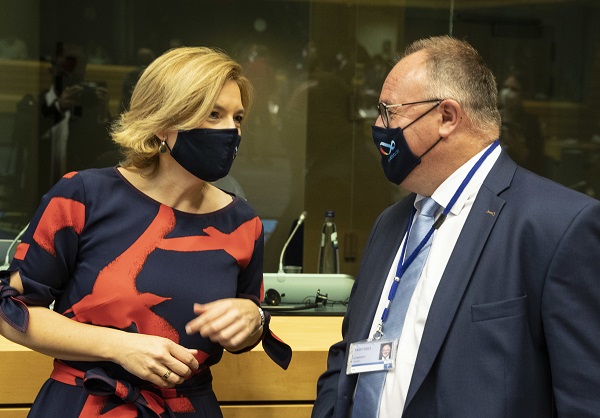 L-R: Julia Klöckner, German Federal Minister of Food, Agriculture and Consumer Protection; Romain Schneider, Luxembourg's Minister of Agriculture, Viticulture and Rural Development;
Credit: © Council of the EU, all rights reserved
L-R: Julia Klöckner, German Federal Minister of Food, Agriculture and Consumer Protection; Romain Schneider, Luxembourg's Minister of Agriculture, Viticulture and Rural Development;
Credit: © Council of the EU, all rights reserved
Luxembourg's Minister of Agriculture, Viticulture and Rural Development, Romain Schneider, participated in the European Union (EU) Agriculture and Fisheries Council on Monday in Brussels - the first in-person meeting of ministers since the start of the COVID-19 pandemic.
With Germany taking over the rotating Presidency of the Council of the EU, German Agriculture Minister Julia Klöckner presented her work programme for the second half of 2020.
The ministers then discussed the EU's “From Farm to Fork” strategy, which is part of the European Green Deal and the objective of which is to make European food systems more sustainable.
In this context, Minister Romain Schneider recalled his main demands, namely respect for the principle of subsidiarity and equity of EU Member States, as well as the specificities of national agriculture. He stated: “There will be no single solution, but tailor-made national strategies. Recommendations should also take into account national action plans and targets that already exist and have proven to be successful. In Luxembourg, the strategy must respect the predominance of agriculture based on permanent pastures”.
Luxembourg's Agriculture Minister also proposed that European sustainability standards be applied to imports, so that future EU trade agreements are consistent with the priorities and measures of the strategy.
With sustainable architecture being one of the most important issues of the common agricultural policy (CAP) reform and closely linked to the “From Farm to Fork” strategy, Minister Romain Schneider reiterated that Luxembourg remains very attached to a high and ambitious level of environmental and climate ambition for the CAP. However, the orientation must be based on subsidiarity, national specificities, performance and results. When it comes to ecological and greening programmes, the minister maintained that farmers' multi-year agri-environmental measures and commitments are the most effective when it comes to meeting environmental and climate goals.
Regarding the inclusion of sustainability, nutritional quality and animal welfare in food labelling, as proposed by the German Presidency, Minister Romain Schneider welcomed the current suggestions aimed at improving animal welfare and the conditions of transport of farm animals, but warned against overdoing it: “Too much labelling is counterproductive and will ultimately undermine transparency. In Luxembourg, we intend to simplify the jungle of labels by streamlining the various labeling systems”.
In addition, the ministers analysed the impact of the COVID-19 crisis on agricultural markets. In Luxembourg, the pig and beef sectors in particular, as well as tourism and restaurants, have suffered the consequences of the pandemic. Minister Romain Schneider expressed concern: "We will have to follow developments very closely to quickly obtain an overview of market developments, in particular if the situation continues".








